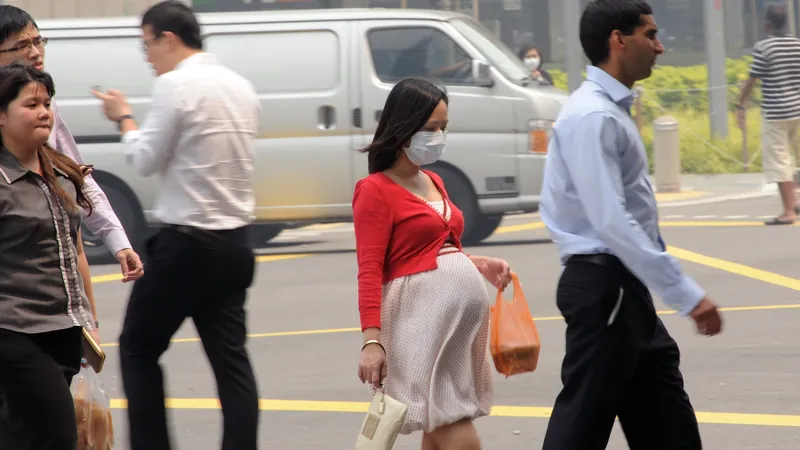
Shocking Discovery: Even Short Exposure to Air Pollution Can Trigger Inflammation in the Placenta!
2025-09-17
Author: Arjun
Groundbreaking Lab Study Reveals Alarming Effects of Air Pollution on Pregnancy
A revolutionary laboratory study has unveiled that even brief encounters with air pollution can transform the placenta into an inflammatory powerhouse, suggesting dire implications for maternal and fetal health.
While scientists have long acknowledged that harmful particles in polluted air can reach the placenta, recent insights delve deeper into the mechanism at play. Dr. Jonathan Grigg, a pediatric respiratory expert at Queen Mary University of London, commented on the urgency of understanding this phenomenon, particularly its potential ties to complications like preeclampsia — a condition that could jeopardize both mother and child.
How the Research Was Conducted: A Look Inside the Lab
Published in the Journal of Environmental Sciences, this cutting-edge research used what’s called "ex vivo dual placental perfusion." In simpler terms, researchers collected healthy, full-term placentas from volunteers after birth. A total of 13 placentas were carefully studied using a state-of-the-art system that simulated the conditions of a pregnant woman's body.
This innovative method involved connecting the placentas to an artificial circulatory model, allowing scientists to monitor their metabolic functions in real-time. Dr. Stefan Hansson, a key co-author, emphasized the necessity of this approach, given the ethical complexities of exposing pregnant women to pollution levels for experimental purposes.
Results: Air Pollutants Alter Placental Health
Researchers introduced pollutants from a highly trafficked area in Malmö, Sweden, to the perfusion system. Astonishingly, even mere exposure for 30 minutes induced noticeable changes in collagen structure within the placentas, disrupting tissue organization.
Moreover, after just one hour of exposure, the placentas ramped up the production of human chorionic gonadotropin (hCG), a hormone crucial during early pregnancy. Alarmingly, elevated hCG levels in later stages can suggest increased risks for conditions such as preeclampsia.
Inflammation: A Key Player in Pregnancy Complications
The placental immune cells, known as Hofbauer cells, exhibited a troubling transformation, appearing activated and inflamed. Under normal circumstances, these cells help maintain a balance, but in the context of pollution exposure, this balance tipped towards inflammation, raising serious concerns for developing fetuses.
As Dr. Grigg noted, if sustained exposure has such a drastic impact even in a short time frame, the ramifications over a full-term pregnancy could be significant. The study raises a pivotal question: What long-term effects could these pollutants have on a baby's development?
Implications and Next Steps: A Call to Action
The findings of this research call for urgent actions to reduce air pollution, particularly in areas prone to high traffic. Dr. Grigg strongly advocates for initiatives aimed at lowering levels of PM2.5, the most harmful particulate matter.
These revelations do not, however, suggest immediate lifestyle changes for pregnant women navigating polluted areas. As Dr. Grigg says, there are already myriad factors that mothers-to-be must consider. Nevertheless, the potential for medical interventions to combat inflammation and mitigate risks is an exciting avenue for future research.
In summary, the alarming link between air pollution and placental inflammation underscores the need for greater awareness and action to safeguard maternal and fetal health in our increasingly polluted world.




 Brasil (PT)
Brasil (PT)
 Canada (EN)
Canada (EN)
 Chile (ES)
Chile (ES)
 Česko (CS)
Česko (CS)
 대한민국 (KO)
대한민국 (KO)
 España (ES)
España (ES)
 France (FR)
France (FR)
 Hong Kong (EN)
Hong Kong (EN)
 Italia (IT)
Italia (IT)
 日本 (JA)
日本 (JA)
 Magyarország (HU)
Magyarország (HU)
 Norge (NO)
Norge (NO)
 Polska (PL)
Polska (PL)
 Schweiz (DE)
Schweiz (DE)
 Singapore (EN)
Singapore (EN)
 Sverige (SV)
Sverige (SV)
 Suomi (FI)
Suomi (FI)
 Türkiye (TR)
Türkiye (TR)
 الإمارات العربية المتحدة (AR)
الإمارات العربية المتحدة (AR)